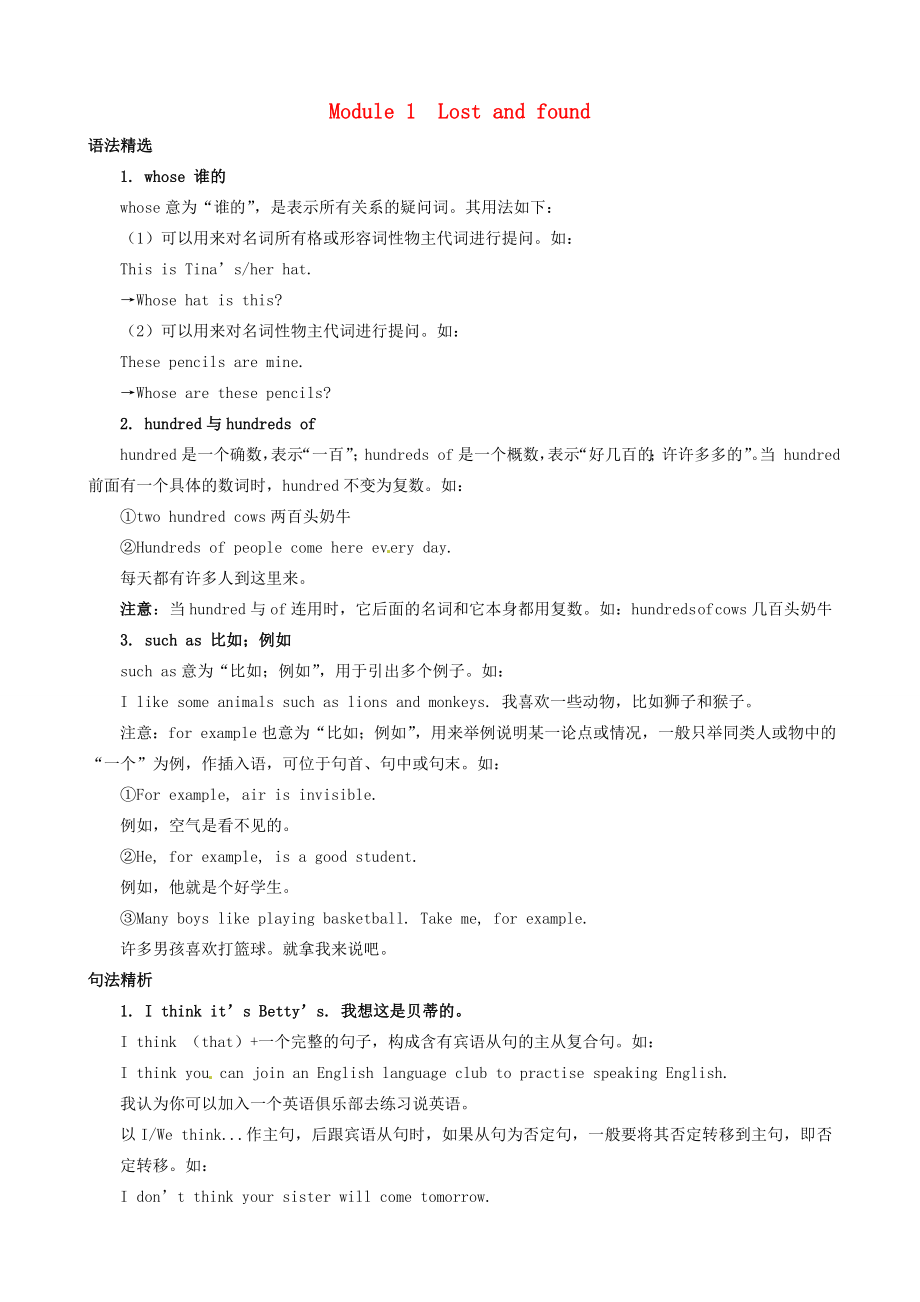《浙江省嘉興市秀洲區(qū)七年級(jí)英語(yǔ)下冊(cè)詞法語(yǔ)法手冊(cè)Module1Lostandfound復(fù)習(xí)素材新版外研版新版外研版初中七年級(jí)下冊(cè)英語(yǔ)素材》由會(huì)員分享���,可在線閱讀����,更多相關(guān)《浙江省嘉興市秀洲區(qū)七年級(jí)英語(yǔ)下冊(cè)詞法語(yǔ)法手冊(cè)Module1Lostandfound復(fù)習(xí)素材新版外研版新版外研版初中七年級(jí)下冊(cè)英語(yǔ)素材(4頁(yè)珍藏版)》請(qǐng)?jiān)谘b配圖網(wǎng)上搜索�����。
1�����、Module 1 Lost and found
語(yǔ)法精選
1. whose 誰(shuí)的
whose意為“誰(shuí)的”����,是表示所有關(guān)系的疑問(wèn)詞���。其用法如下:
(1)可以用來(lái)對(duì)名詞所有格或形容詞性物主代詞進(jìn)行提問(wèn)�。如:
This is Tina’s/her hat.
→Whose hat is this?
(2)可以用來(lái)對(duì)名詞性物主代詞進(jìn)行提問(wèn)�����。如:
These pencils are mine.
→Whose are these pencils?
2. hundred與hundreds of
hundred是一個(gè)確數(shù)��,表示“一百”��;hundreds of是一個(gè)概數(shù),表示“好幾百的���;許
2、許多多的”�。當(dāng) hundred前面有一個(gè)具體的數(shù)詞時(shí)���,hundred不變?yōu)閺?fù)數(shù)。如:
①two hundred cows兩百頭奶牛
②Hundreds of people come here every day.
每天都有許多人到這里來(lái)�。
注意:當(dāng)hundred與of連用時(shí),它后面的名詞和它本身都用復(fù)數(shù)�����。如:hundreds of cows幾百頭奶牛
3. such as 比如���;例如
such as意為“比如�����;例如”,用于引出多個(gè)例子��。如:
I like some animals such as lions and monkeys. 我喜歡一些動(dòng)物����,比如獅子和猴子。
注意:fo
3�、r example也意為“比如���;例如”�,用來(lái)舉例說(shuō)明某一論點(diǎn)或情況��,一般只舉同類(lèi)人或物中的“一個(gè)”為例�,作插入語(yǔ)����,可位于句首����、句中或句末。如:
①For example, air is invisible.
例如��,空氣是看不見(jiàn)的����。
②He, for example, is a good student.
例如,他就是個(gè)好學(xué)生�����。
③Many boys like playing basketball. Take me, for example.
許多男孩喜歡打籃球�。就拿我來(lái)說(shuō)吧���。
句法精析
1. I think it’s Betty’s. 我想這是貝蒂的��。
I think (th
4���、at)+一個(gè)完整的句子�����,構(gòu)成含有賓語(yǔ)從句的主從復(fù)合句���。如:
I think you can join an English language club to practise speaking English.
我認(rèn)為你可以加入一個(gè)英語(yǔ)俱樂(lè)部去練習(xí)說(shuō)英語(yǔ)�。
以I/We think...作主句���,后跟賓語(yǔ)從句時(shí)��,如果從句為否定句��,一般要將其否定轉(zhuǎn)移到主句����,即否定轉(zhuǎn)移�����。如:
I don’t think your sister will come tomorrow.
我認(rèn)為你姐姐明天不會(huì)來(lái)的��。
2. At the moment, there are also some strange th
5��、ings at the New York City Lost and Found Office.
現(xiàn)在�����,在紐約失物招領(lǐng)處還有一些奇怪的東西。
(1)at the moment意為“此時(shí)此刻����;現(xiàn)在”�����,相當(dāng)于now�,常用于現(xiàn)在進(jìn)行時(shí)態(tài),可放在句首或句末���。如:
He is playing football at the moment.
現(xiàn)在他正在踢足球����。
(2)strange作形容詞,意為“奇怪的”����,在句中常作定語(yǔ)或表語(yǔ)。作表語(yǔ)時(shí)常用于“It’s strange+that從句”��,意為“奇怪的是……”�����。如:
①What a strange idea!多么奇怪的想法��!
②It’s stra
6�����、nge that you don’t know him.
奇怪的是你不認(rèn)識(shí)他����。
語(yǔ)法精講
名詞性物主代詞
形式
人稱(chēng)
主格
賓格
形容詞性
物主代詞
名詞性物
主代詞
單數(shù)
第一人稱(chēng)
I
me
my
mine
第二人稱(chēng)
you
you
your
yours
第三人稱(chēng)
he
she
it
him
her
it
his
her
its
his
hers
its
復(fù)數(shù)
第一人稱(chēng)
we
us
our
ours
第二人稱(chēng)
you
you
your
yours
第三人稱(chēng)
they
them
7����、their
theirs
英語(yǔ)中的物主代詞,如下表:
(1)人稱(chēng)代詞的主格在句子中作主語(yǔ)����。
(2)人稱(chēng)代詞的賓格在句子中作動(dòng)詞或介詞的賓語(yǔ)���,be動(dòng)詞后作表語(yǔ)���。
(3)名詞性物主代詞=形容詞性物主代詞+名詞���。
試題精編
一、根據(jù)句意及漢語(yǔ)提示完成句子
1. At the (飛機(jī)場(chǎng)), she helps a man find his daughter.
2. Some students go to school by (船).
3. He meets many strange people a
8、nd things at the lost and found (室���;處).
4. There are ten kilos of (臘腸) at the lost and found office.
5. Linda lost her wallet in a (匆忙).
6. There are (百) of people in the park on Sunday.
7. My favourite animals are (鴨子).
8. — (為什么) do yo
9��、u like doing sports?
—Because it can help me keep healthy.
9. The man is so (認(rèn)真的) that he asks me so many questions.
10. I went to Beijing by (飛機(jī)) last week.
二、用適當(dāng)?shù)拇~填空
1. Ann is my aunt. We often visit .
2. These new houses are so nice. are very expens
10�����、ive.
3. My desk is over there. This is not .
4. Mike is my classmate. is good at PE.
5. We are in the same class. classroom is big and nice.
6. That’s a cat. name is Mimi.
7. Sam and Peter, look at hands. They are so dirty.
8. Mary likes re
11、d clothes. The skirt may be .
9. Look!The dog is running everywhere. dog is it?
10. Our new shoes are very comfortable. What about ?
三�����、選詞填空
who lose her care purple
1. It’s not my bag. Let me ask Lingling, maybe it’s .
2. pen is this?
3
12���、. Mary’s shoes are .
4. Mr Smith is talking to a boy at the and found office.
5. Is this your sweater, Tom? Please be with your things.
四�、句型轉(zhuǎn)換
1. People often lose things when they are in a hurry. (對(duì)畫(huà)線部分提問(wèn))
people often things?
13、
2. There are also a lot of animals at the lost and found office. (改為同義句)
There are animals at the lost and found office .
3. There are some strange things at the lost and found office. (改為否定句)
There strange things at the lost and found
14�����、 office.
4. He is looking for his phone, camera and watch. (改為復(fù)數(shù)句)
They looking for phones, cameras and .
5. These gloves are my father’s. (改為一般疑問(wèn)句��,并作否定回答)
— gloves your father’s?
— , .
五����、語(yǔ)法填空
閱讀下面短文,按照句子結(jié)構(gòu)
15���、的語(yǔ)法性和上下文連貫的要求��,在空格處填入一個(gè)適當(dāng)?shù)脑~或使用括號(hào)中詞語(yǔ)的正確形式填空(每空不多于2個(gè)單詞)���。
Dear friends,
We are very happy to see 1 (thou-sand) of people go to the Voice of China. Thank you for your help, the big parties 2 (be) great. 3 now there are too many things here. You leave some of your things, lik
16、e the4 (watch), the cameras and even ID cards and so on. You can do like these.
5 (one), you can call the number 234 5678. Then we send 6 (you) back. Also you can ask the police 7 help. Finally, you can come to the sports centre. The workers here may tell you
17、 how to find 8 (they).
But we want 9 (say), please look after your things 10 (good) next summer!
The Voice of China
參 考 答 案
Module 1
一����、1. airport 2. boat 3. office 4. sausages 5.hurry
6. hundreds 7. ducks 8. Why 9
18、. careful 10. plane
二����、1. her 2. They 3. mine 4. He 5. Our
6. Its 7. your 8. hers 9. Whose 10. yours
三���、1. hers 2. Whose 3. purple 4. lost 5. careful
四���、1. When do, lose 2. lots of, too 3. aren’t any 4.are, their, watches
5. Are these, No, they aren’t
五、1. thousands 2. are 3. But 4. watches 5. First
6. yours 7. for 8. them 9. to say 10. well
 浙江省嘉興市秀洲區(qū)七年級(jí)英語(yǔ)下冊(cè)詞法語(yǔ)法手冊(cè)Module1Lostandfound復(fù)習(xí)素材新版外研版新版外研版初中七年級(jí)下冊(cè)英語(yǔ)素材
浙江省嘉興市秀洲區(qū)七年級(jí)英語(yǔ)下冊(cè)詞法語(yǔ)法手冊(cè)Module1Lostandfound復(fù)習(xí)素材新版外研版新版外研版初中七年級(jí)下冊(cè)英語(yǔ)素材

